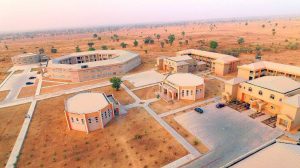Best Universities to Study Environmental Studies in Nigeria
Environmental sciences is the study of environmental problems and how human activity affects the environment. It looks at issues like pollution, polar ice cap melting, desertification, deforestation, global warming, and more.
There are five basic fields of studies in Environmental Science which includes atmospheric sciences, ecology, environmental chemistry, geosciences, and social sciences.
Environmental Science is a 4-years programme. The curriculum includes courses in biology, chemistry, economics, geography, geology, and mathematics in order to develop a wide understanding of environmental concerns and factors.
Best Universities to Study Environmental Science in Nigeria

Below are the best universities to study environmental science
University of Ibadan
The University of Ibadan in Nigeria established the first environmental studies program in West Africa. For over 50 years, they have been training students to understand and find solutions for environmental issues facing the region.
Their Department of Environmental Health Sciences offers degrees in areas like Pollution Control, Environmental Toxicology, and Environmental Management. Students learn through a mix of classroom work, field studies, and internships with groups like the Nigerian Conservation Foundation.
Graduates go on to careers protecting human and environmental health at organizations across Nigeria and beyond. Some work on policy, helping governments craft smarter laws around waste management, deforestation, and industrial pollution. Others do hands-on work, conducting environmental impact assessments for new roads or mines, ensuring they meet standards to avoid damage.
The program has also produced leaders in academia, now training new generations of environmental stewards. Dr. Oladele Osibanjo, the current department head, is a pioneer in e-waste management and has advised governments worldwide on hazardous waste policy.
With rapid urbanization in Nigeria threatening both natural habitats and public health, the work of the University of Ibadan’s environmental programs has never been more critical. By equipping students with the knowledge and skills to tackle issues like water scarcity, air quality, and sustainable energy, they are shaping a greener future for Nigeria and beyond. Their environmental leaders and innovators are preserving paradise.
University of Lagos
The University of Lagos is working to protect and restore the Niger Delta, one of the world’s most ecologically sensitive wetlands.
Through programs in environmental management and petroleum engineering, Unilag students learn how to balance resource extraction with habitat preservation. They study issues like oil spill response, waste management, and environmental impact assessments.
Unilag partners with NGOs like the Nigerian Conservation Foundation to offer students real-world experience. “Working with local communities has shown me how environmental degradation directly impacts people’s lives,” says graduate student Amina Ibrahim.
- Research projects focus on sustainable solutions for regional problems like coastal erosion, deforestation, and pollution from oil refineries. Students monitor water quality, survey biodiversity, and test new bioremediation techniques.
- Unilag’s Center for Environment, Human Rights and Development trains students to become environmental advocates and helps communities access legal resources. “We teach students that environmental rights are human rights,” says the Center’s director, Dr. Gloria Ekhator.
With over 300 million people depending on the Niger Delta’s natural resources, Unilag’s environmental programs are helping build a greener future for Nigeria. Graduates go on to jobs improving public health, sustainable development, and corporate social responsibility across the country.
Through interdisciplinary work and community partnerships, Unilag is cultivating the next generation of environmental stewards in Nigeria. Its students and faculty are protecting the Niger Delta, one project at a time.
READ ALSO: Best Universities to Study Economics in Nigeria
University of Ilorin
The University of Ilorin in Nigeria aims to equip students with the knowledge and skills to tackle sustainability challenges.
The University of Ilorin has several departments focused on environmental studies and sustainability. The Department of Agricultural Economics and Farm Management researches sustainable agricultural practices and policies to improve food security while reducing environmental impact. The Department of Agricultural and Biosystems Engineering explores renewable energy technologies like solar-powered irrigation systems.
Students can pursue degrees in Environmental Management, Agriculture, Forestry, Fisheries, and Wildlife to gain a broad understanding of natural resource systems and sustainability. For example, the Fisheries and Aquaculture program teaches students how to manage fish populations and aquatic ecosystems sustainably. The Forestry and Wildlife program focuses on biodiversity conservation and sustainable forestry.
interdisciplinary research is also encouraged across departments. Recent projects include using biochar and compost to improve soil quality, developing climate-resilient crop varieties, and promoting energy efficiency on campus. The university aims to become a model of sustainability by improving waste management, reducing energy usage, and greening campus infrastructure.
By focusing research and education on sustainability, the University of Ilorin is cultivating environmental stewards to tackle issues like renewable energy, sustainable agriculture, and habitat conservation. Students graduate with the knowledge and skills to implement sustainable solutions, improve natural resource management, and build a greener future for Nigeria.
READ ALSO: Best Universities to Study Peace and Conflict Resolution in Nigeria
Federal University of Technology, Akure
The Federal University of Technology, Akure (FUTA) in Nigeria aims to develop solutions to environmental issues through interdisciplinary research and education. FUTA offers degree programs focused on environmental resources management, environmental engineering, and environmental science.
FUTA has state-of-the-art research facilities for environmental studies, including:
- An Environmental Biotechnology Research Laboratory to study bioremediation of pollutants
- A Hydrobiology Research Laboratory to analyze water quality
- A Remote Sensing and Geographical Information System Laboratory for environmental mapping
- An Environmental Management Laboratory to research waste management solutions
FUTA promotes collaboration across departments and with partners in government, NGOs, and industry. Researchers from fields like biology, chemistry, engineering, and agriculture work together to gain insights into complex environmental problems. Partnerships with groups like the Nigerian Conservation Foundation allow students to participate in environmental projects outside the classroom.
FUTA offers innovative programs like a master’s in Climate Change and Adaptation, preparing students to help communities adapt to changes happening now. An Environmental Law program examines policies and legal frameworks for environmental protection. Students even have opportunities to study abroad through exchange programs with universities in Germany, Malaysia, China, and beyond.
By training students in advanced research methods, facilitating interdisciplinary work, and developing innovative new programs, FUTA is cultivating the next generation of environmental leaders in Nigeria. Graduates go on to careers as environmental consultants, researchers, and policy experts, working to create sustainable solutions for the future. FUTA’s environmentally-focused education is helping to safeguard natural resources and protect communities in Nigeria and beyond.
University of Nigeria, Nsukka
The University of Nigeria, Nsukka offers programs focused on environmental management and sustainability. This prestigious university is educating the next generation of environmental leaders in Nigeria.
UNN offers bachelor’s degrees in Environmental Resource Management, Environmental Biology and Environmental Microbiology. These interdisciplinary programs provide students with a strong science background as well as courses in environmental policy, law and economics. Graduates pursue careers as environmental consultants, researchers and managers in government agencies and private companies.
UNN is also home to several environmental research centers, including the Center for Environmental Research and Development, Center for Climate Change and Environmental Research, and Center for Environmental Safety and Health Research. Researchers at these centers partner with government agencies, NGOs and private companies on projects aimed at promoting sustainability and improving environmental quality across Nigeria.
By training future researchers, policymakers and business leaders, the University of Nigeria is cultivating a generation of Nigerians prepared to tackle the country’s pressing environmental challenges. UNN’s environmentally-focused academic programs and research centers are helping to drive sustainability in Nigeria and beyond.
READ ALSO: Best Universities to Study Communication Programs in Nigeria
FAQ
Many prospective students considering communication programs in Nigeria likely have questions about the field of study and process. Here are some of the most frequently asked questions and their answers:
What will I study?
The core curriculum typically includes classes on environmental policy, sustainability, natural resource management, and environmental protection. You’ll learn about topics such as:
- Environmental laws and ethics
- Pollution control and waste management
- Renewable energy and green technology
- Ecosystems, biodiversity and conservation
- Environmental health and safety
Some programs may offer specializations in areas like environmental chemistry, environmental economics or environmental planning. There are many exciting paths of study in this growing field.
What jobs can I get after graduating?
An environmental sciences degree prepares you for many “green jobs” that are in high demand. Some options include:
- Environmental consultant: Help organizations comply with environmental regulations and improve sustainability.
- Conservation officer: Protect natural resources and enforce environmental laws.
- Environmental educator: Teach communities about environmental issues and sustainability.
- Environmental engineer: Design technologies and systems for pollution control, waste treatment, and green energy.
- Sustainability manager: Help organizations reduce their environmental impact and carbon footprint.
The job opportunities in environmental sciences are only continuing to expand as sustainability and climate change become higher priorities around the world. An environmental sciences degree from a Nigerian university will position you well for an exciting career protecting our planet.









